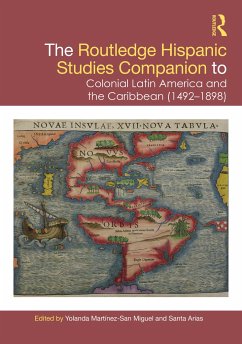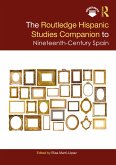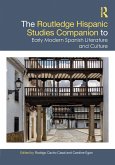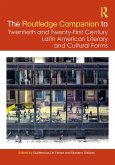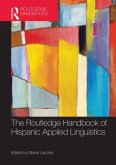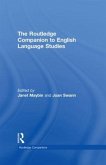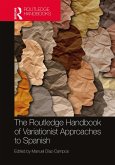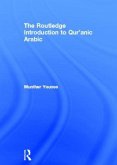The Routledge Hispanic Studies Companion to Colonial Latin America and the Caribbean (1492-1898)
Herausgeber: Martínez-San Miguel, Yolanda; Arias, Santa
The Routledge Hispanic Studies Companion to Colonial Latin America and the Caribbean (1492-1898)
Herausgeber: Martínez-San Miguel, Yolanda; Arias, Santa
- Gebundenes Buch
- Merkliste
- Auf die Merkliste
- Bewerten Bewerten
- Teilen
- Produkt teilen
- Produkterinnerung
- Produkterinnerung
The Routledge Hispanic Studies Companion to Colonial Latin America and the Caribbean (1492-1898) brings together an international team of scholars to explore new interdisciplinary and comparative approaches for the study of colonialism.
Andere Kunden interessierten sich auch für
![The Routledge Hispanic Studies Companion to Nineteenth-Century Spain The Routledge Hispanic Studies Companion to Nineteenth-Century Spain]() The Routledge Hispanic Studies Companion to Nineteenth-Century Spain303,99 €
The Routledge Hispanic Studies Companion to Nineteenth-Century Spain303,99 €![The Routledge Hispanic Studies Companion to Early Modern Spanish Literature and Culture The Routledge Hispanic Studies Companion to Early Modern Spanish Literature and Culture]() The Routledge Hispanic Studies Companion to Early Modern Spanish Literature and Culture304,99 €
The Routledge Hispanic Studies Companion to Early Modern Spanish Literature and Culture304,99 €![The Routledge Companion to Twentieth and Twenty-First Century Latin American Literary and Cultural Forms The Routledge Companion to Twentieth and Twenty-First Century Latin American Literary and Cultural Forms]() The Routledge Companion to Twentieth and Twenty-First Century Latin American Literary and Cultural Forms304,99 €
The Routledge Companion to Twentieth and Twenty-First Century Latin American Literary and Cultural Forms304,99 €![The Routledge Handbook of Hispanic Applied Linguistics The Routledge Handbook of Hispanic Applied Linguistics]() The Routledge Handbook of Hispanic Applied Linguistics311,99 €
The Routledge Handbook of Hispanic Applied Linguistics311,99 €![The Routledge Companion to English Language Studies The Routledge Companion to English Language Studies]() Janet MaybinThe Routledge Companion to English Language Studies163,99 €
Janet MaybinThe Routledge Companion to English Language Studies163,99 €![The Routledge Handbook of Variationist Approaches to Spanish The Routledge Handbook of Variationist Approaches to Spanish]() The Routledge Handbook of Variationist Approaches to Spanish304,99 €
The Routledge Handbook of Variationist Approaches to Spanish304,99 €![The Routledge Introduction to Qur'anic Arabic The Routledge Introduction to Qur'anic Arabic]() Munther YounesThe Routledge Introduction to Qur'anic Arabic217,99 €
Munther YounesThe Routledge Introduction to Qur'anic Arabic217,99 €-
-
-
The Routledge Hispanic Studies Companion to Colonial Latin America and the Caribbean (1492-1898) brings together an international team of scholars to explore new interdisciplinary and comparative approaches for the study of colonialism.
Hinweis: Dieser Artikel kann nur an eine deutsche Lieferadresse ausgeliefert werden.
Hinweis: Dieser Artikel kann nur an eine deutsche Lieferadresse ausgeliefert werden.
Produktdetails
- Produktdetails
- Verlag: Routledge
- Seitenzahl: 462
- Erscheinungstermin: 30. November 2020
- Englisch
- Abmessung: 250mm x 175mm x 29mm
- Gewicht: 970g
- ISBN-13: 9781138092952
- ISBN-10: 1138092959
- Artikelnr.: 59997257
- Herstellerkennzeichnung
- Libri GmbH
- Europaallee 1
- 36244 Bad Hersfeld
- gpsr@libri.de
- Verlag: Routledge
- Seitenzahl: 462
- Erscheinungstermin: 30. November 2020
- Englisch
- Abmessung: 250mm x 175mm x 29mm
- Gewicht: 970g
- ISBN-13: 9781138092952
- ISBN-10: 1138092959
- Artikelnr.: 59997257
- Herstellerkennzeichnung
- Libri GmbH
- Europaallee 1
- 36244 Bad Hersfeld
- gpsr@libri.de
Yolanda Martínez-San Miguel is Professor and Marta S. Weeks Chair in Latin American Studies in the Department of Modern Languages and Literatures at the University of Miami. Santa Arias is Professor of Latin American Literatures and Cultures in the Department of Spanish and Portuguese at the University of Kansas.
Introduction: between colonialism and coloniality: colonial Latin American
and Caribbean studies today PART I: Colonialism and Coloniality 1. Race and
domination in colonial Latin American studies 2. Self-representation and
self-governance in early Latin America 3. Mestizaje as dispositif for a
paradigm shift in colonial studies 4. Race, ethnicity and nationhood in the
formation of criollismo in Spanish America 5. An integrational approach to
colonial semiosis 6. Latin American and Caribbean Colonial Studies and/in
the Decolonial Turn 7. The ecocritical turn and the study of early colonial
societies in the Caribbean: of dogs, rivers, and the environmental
humanities 8. Coloniality and Cinema PART II: Knowledge Production and
Networks 9. Old testament, New World: diluvialism and the Amerindian
origins debate in the Enlightenment 10. The "cannibal cogito" and Brazilian
antropofagia: radical heterogeneity or "family resemblance"? 11.
Presumptions of empire: relapses, reboots, and reversions in the
Transpacific networks of Iberian globalization 12. Imperial tension,
colonial contours: Jesuits, slavery, and race within and beyond the
Portuguese Atlantic 13. The Caribbean conundrum: José Antonio Saco's
Hispanic archive and the Black Atlantic PART III: Materialities and
Archives 14. Material Encounters: Columbus's Diario del primer viaje and
the objects of colonial Latin American and Caribbean studies 15. It comes
with the territory: indigenous materialities and western knowledge 16.
Creole knowledge in colonial Mexico: religion, gender and power 17. The
colonial Latin American archive: dispossession, ruins, reinvention 18.
Materialities and archives 19. Port cities as sites of spatial knowledge in
eighteenth-century Spanish America 20. Space, movement and writing in
Colonial Río de la Plata PART IV: Language, Translation and Beyond 21. The
white legend: El Dorado, Pachakuti, and Walter Raleigh's discovery of
(Latin) America 22. The agency of translation in colonial Latin America:
re-thinking the roles of non-European linguistic intermediaries 23.
Intercultural (mis)translations: colonial static and "authorship" in the
Florentine Codex and the Relaciones geográficas of New Spain 24. Defending
the indefensible: Las Casas and the exceptions to sovereignty 25. The
(dis)continuities of decolonized gender and sexual identity in the Andes
and Caribbean studies today PART I: Colonialism and Coloniality 1. Race and
domination in colonial Latin American studies 2. Self-representation and
self-governance in early Latin America 3. Mestizaje as dispositif for a
paradigm shift in colonial studies 4. Race, ethnicity and nationhood in the
formation of criollismo in Spanish America 5. An integrational approach to
colonial semiosis 6. Latin American and Caribbean Colonial Studies and/in
the Decolonial Turn 7. The ecocritical turn and the study of early colonial
societies in the Caribbean: of dogs, rivers, and the environmental
humanities 8. Coloniality and Cinema PART II: Knowledge Production and
Networks 9. Old testament, New World: diluvialism and the Amerindian
origins debate in the Enlightenment 10. The "cannibal cogito" and Brazilian
antropofagia: radical heterogeneity or "family resemblance"? 11.
Presumptions of empire: relapses, reboots, and reversions in the
Transpacific networks of Iberian globalization 12. Imperial tension,
colonial contours: Jesuits, slavery, and race within and beyond the
Portuguese Atlantic 13. The Caribbean conundrum: José Antonio Saco's
Hispanic archive and the Black Atlantic PART III: Materialities and
Archives 14. Material Encounters: Columbus's Diario del primer viaje and
the objects of colonial Latin American and Caribbean studies 15. It comes
with the territory: indigenous materialities and western knowledge 16.
Creole knowledge in colonial Mexico: religion, gender and power 17. The
colonial Latin American archive: dispossession, ruins, reinvention 18.
Materialities and archives 19. Port cities as sites of spatial knowledge in
eighteenth-century Spanish America 20. Space, movement and writing in
Colonial Río de la Plata PART IV: Language, Translation and Beyond 21. The
white legend: El Dorado, Pachakuti, and Walter Raleigh's discovery of
(Latin) America 22. The agency of translation in colonial Latin America:
re-thinking the roles of non-European linguistic intermediaries 23.
Intercultural (mis)translations: colonial static and "authorship" in the
Florentine Codex and the Relaciones geográficas of New Spain 24. Defending
the indefensible: Las Casas and the exceptions to sovereignty 25. The
(dis)continuities of decolonized gender and sexual identity in the Andes
Introduction: between colonialism and coloniality: colonial Latin American
and Caribbean studies today PART I: Colonialism and Coloniality 1. Race and
domination in colonial Latin American studies 2. Self-representation and
self-governance in early Latin America 3. Mestizaje as dispositif for a
paradigm shift in colonial studies 4. Race, ethnicity and nationhood in the
formation of criollismo in Spanish America 5. An integrational approach to
colonial semiosis 6. Latin American and Caribbean Colonial Studies and/in
the Decolonial Turn 7. The ecocritical turn and the study of early colonial
societies in the Caribbean: of dogs, rivers, and the environmental
humanities 8. Coloniality and Cinema PART II: Knowledge Production and
Networks 9. Old testament, New World: diluvialism and the Amerindian
origins debate in the Enlightenment 10. The "cannibal cogito" and Brazilian
antropofagia: radical heterogeneity or "family resemblance"? 11.
Presumptions of empire: relapses, reboots, and reversions in the
Transpacific networks of Iberian globalization 12. Imperial tension,
colonial contours: Jesuits, slavery, and race within and beyond the
Portuguese Atlantic 13. The Caribbean conundrum: José Antonio Saco's
Hispanic archive and the Black Atlantic PART III: Materialities and
Archives 14. Material Encounters: Columbus's Diario del primer viaje and
the objects of colonial Latin American and Caribbean studies 15. It comes
with the territory: indigenous materialities and western knowledge 16.
Creole knowledge in colonial Mexico: religion, gender and power 17. The
colonial Latin American archive: dispossession, ruins, reinvention 18.
Materialities and archives 19. Port cities as sites of spatial knowledge in
eighteenth-century Spanish America 20. Space, movement and writing in
Colonial Río de la Plata PART IV: Language, Translation and Beyond 21. The
white legend: El Dorado, Pachakuti, and Walter Raleigh's discovery of
(Latin) America 22. The agency of translation in colonial Latin America:
re-thinking the roles of non-European linguistic intermediaries 23.
Intercultural (mis)translations: colonial static and "authorship" in the
Florentine Codex and the Relaciones geográficas of New Spain 24. Defending
the indefensible: Las Casas and the exceptions to sovereignty 25. The
(dis)continuities of decolonized gender and sexual identity in the Andes
and Caribbean studies today PART I: Colonialism and Coloniality 1. Race and
domination in colonial Latin American studies 2. Self-representation and
self-governance in early Latin America 3. Mestizaje as dispositif for a
paradigm shift in colonial studies 4. Race, ethnicity and nationhood in the
formation of criollismo in Spanish America 5. An integrational approach to
colonial semiosis 6. Latin American and Caribbean Colonial Studies and/in
the Decolonial Turn 7. The ecocritical turn and the study of early colonial
societies in the Caribbean: of dogs, rivers, and the environmental
humanities 8. Coloniality and Cinema PART II: Knowledge Production and
Networks 9. Old testament, New World: diluvialism and the Amerindian
origins debate in the Enlightenment 10. The "cannibal cogito" and Brazilian
antropofagia: radical heterogeneity or "family resemblance"? 11.
Presumptions of empire: relapses, reboots, and reversions in the
Transpacific networks of Iberian globalization 12. Imperial tension,
colonial contours: Jesuits, slavery, and race within and beyond the
Portuguese Atlantic 13. The Caribbean conundrum: José Antonio Saco's
Hispanic archive and the Black Atlantic PART III: Materialities and
Archives 14. Material Encounters: Columbus's Diario del primer viaje and
the objects of colonial Latin American and Caribbean studies 15. It comes
with the territory: indigenous materialities and western knowledge 16.
Creole knowledge in colonial Mexico: religion, gender and power 17. The
colonial Latin American archive: dispossession, ruins, reinvention 18.
Materialities and archives 19. Port cities as sites of spatial knowledge in
eighteenth-century Spanish America 20. Space, movement and writing in
Colonial Río de la Plata PART IV: Language, Translation and Beyond 21. The
white legend: El Dorado, Pachakuti, and Walter Raleigh's discovery of
(Latin) America 22. The agency of translation in colonial Latin America:
re-thinking the roles of non-European linguistic intermediaries 23.
Intercultural (mis)translations: colonial static and "authorship" in the
Florentine Codex and the Relaciones geográficas of New Spain 24. Defending
the indefensible: Las Casas and the exceptions to sovereignty 25. The
(dis)continuities of decolonized gender and sexual identity in the Andes

